
The Book of Joshua is the sixth book in the Hebrew Bible and the Christian Old Testament, and is the first book of the Deuteronomistic history, the story of Israel from the conquest of Canaan to the Babylonian exile. It tells of the campaigns of the Israelites in central, southern and northern Canaan, the destruction of their enemies, and the division of the land among the Twelve Tribes, framed by two set-piece speeches, the first by God commanding the conquest of the land, and, at the end, the second by Joshua warning of the need for faithful observance of the Law (torah) revealed to Moses.

The Book of Kings is a book in the Hebrew Bible and two books in the Christian Old Testament. It concludes the Deuteronomistic history, a history of Israel also including the books of Joshua and Judges and the Books of Samuel.
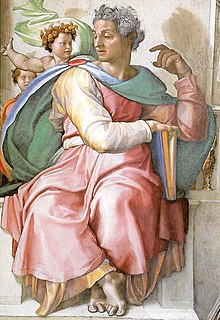
Isaiah was the 8th-century BC Israelite prophet after whom the Book of Isaiah is named.

Joshua or Jehoshua was Moses' assistant in the books of Exodus and Numbers, and later succeeded Moses as leader of the Israelite tribes in the Hebrew Bible's Book of Joshua. His name was Hoshea the son of Nun, of the tribe of Ephraim, but Moses called him Joshua, the name by which he is commonly known. According to the Bible he was born in Egypt prior to the Exodus.

The Old Testament is the first division of the Christian biblical canon, which is based primarily upon the 24 books of the Hebrew Bible, a collection of ancient religious Hebrew writings by the Israelites believed by most Christians and religious Jews to be the sacred Word of God. The second division of Christian Bibles is the New Testament, written in the Koine Greek language.

William Tyndale was an English scholar who became a leading figure in the Protestant Reformation in the years leading up to his execution. He is well known as a translator of the Bible into English, influenced by the works of Erasmus of Rotterdam and Martin Luther.

Nebuchadnezzar II, also Nebuchadrezzar II, king of Babylon c. 605 BC – c. 562 BC, was the longest-reigning and most powerful monarch of the Neo-Babylonian Empire.
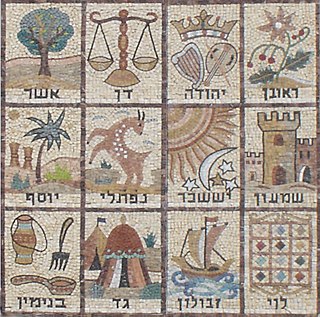
The Israelites were a confederation of Iron Age Semitic-speaking tribes of the ancient Near East, who inhabited a part of Canaan during the tribal and monarchic periods.

Baal, properly Baʽal, was a title and honorific meaning "owner", "lord" in the Northwest Semitic languages spoken in the Levant during antiquity. From its use among people, it came to be applied to gods. Scholars previously associated the theonym with solar cults and with a variety of unrelated patron deities but inscriptions have shown that the name Baʿal was particularly associated with the storm and fertility god Hadad and his local manifestations.
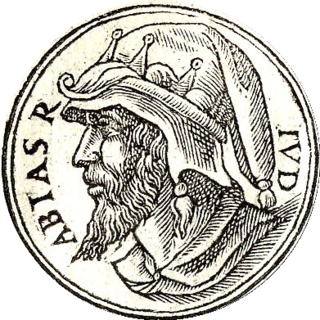
Abijam was, according to the Hebrew Bible, the fourth king of the House of David and the second of the Kingdom of Judah. He was the son of Rehoboam and the grandson of Solomon. The Books of Chronicles refers to him as Abijah.
Adriel literally עדר (flock) י (of) אל (El) The meaning is "God is my Help" according to Holman Illustrated Bible Dictionary. He was a nobleman in the ancient kingdom of Israel. Adriel (Adri-el).
Zaretan is a city mentioned in the Bible, as near the location where the Hebrews crossed the Jordan. In the books of Joshua and 1 Kings, it is called Zarethan, but in 2 Chronicles it is called Zeredathah.
The Matthew Bible, also known as Matthew's Version, was first published in 1537 by John Rogers, under the pseudonym "Thomas Matthew". It combined the New Testament of William Tyndale, and as much of the Old Testament as he had been able to translate before being captured and put to death. Myles Coverdale's translations, chiefly from German and Latin sources, completed the Old Testament and Biblical apocrypha, except for the Prayer of Manasseh, which was Rogers'. It is thus a vital link in the main sequence of English Bible translations.
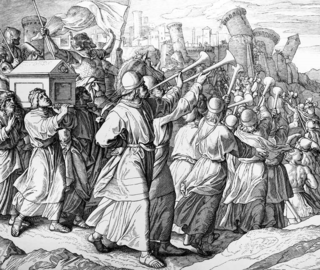
The Battle of Jericho is an incident from the Book of Joshua, being the first battle fought by the Israelites in the course of the conquest of Canaan. According to Joshua 6:1–27, the walls of Jericho fell after the Israelites marched around the city walls once a day for six days and seven times on the seventh day then blew their trumpets. Excavations at Tell es-Sultan, the biblical Jericho, have failed to substantiate this story, which has its origins in the nationalist propaganda of much later kings of Judah and their claims to the territory of the Kingdom of Israel. The lack of archaeological evidence and the composition history and theological purposes of the Book of Joshua have led archaeologists like William G. Dever to characterise the story of the fall of Jericho as "invented out of whole cloth".
Joah is a Hebrew masculine given name, which means "Yahu is his brother" or "God is his brother." It is derived from the two words "Yahu" and "ach". Joah may refer to:
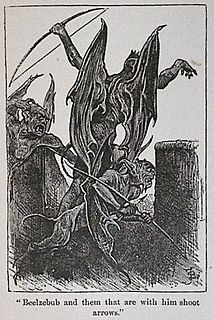
Beelzebub or Beelzebul is a name derived from a Philistine god, formerly worshipped in Ekron, and later adopted by some Abrahamic religions as a major demon. The name Beelzebub is associated with the Canaanite god Baal.










